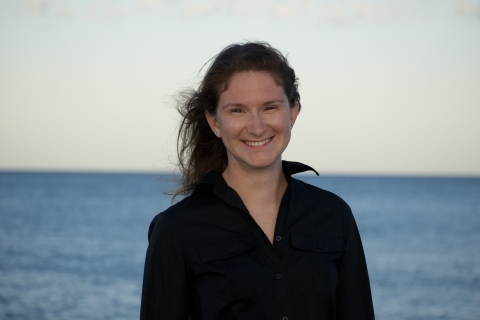Ellen Jacobs - Mars Foundation Scholar
1st Year Scholar, PhD Candidate, Biology
Georgetown University
Research:
Bottlenose dolphins foraging with sponge tools in Shark Bay, Western Australia represent the best documented case of tool use in a wild cetacean, but precise mechanisms of the technique are not known. Ellen's research investigates whether dolphins modify echolocation use while sponging compared to similar foraging methods without sponge tools by combining behavioral, acoustic, and sound propagation modeling techniques.
How will your research benefit society?
This study will be the first to test the “echolocation hypothesis” of sponge foraging in the Shark Bay bottlenose dolphins. Although the incidence of sponging has been well-documented for nearly 40 years of study in Shark Bay, the functional mechanics of the technique remain elusive until the role of echolocation in sponging is known. Dolphins possess one of the most precise and highly specialized echolocation systems in the animal kingdom, so any foraging technique that may specifically minimize its use raises interesting questions about the role of niche partitioning in this densely populated area. Tool-use is often an extension of ability, rarely inhibition of one. Based on genetics and demographic modeling by Kopps & Sherwin (2012), sponging is estimated to have evolved around 250 years ago. Clarifying how echolocation is used in sponging contributes to our understanding of selection pressures favoring the evolution of tool use in marine and terrestrial systems. Additionally, passive listening to a mother’s echolocation may be an important way that a calf can monitor their mother’s location and foraging activities when the mother is out of sight. Temporary mother-calf separations are frequent from a young age. If there is less echolocation to listen for, that may make it more difficult for a calf to track the mother’s movements and learn foraging tactics, which could increase the risk of losing track of the mother, or result in fewer temporary separations, potentially decreasing maternal foraging success and impacting calf skill development. Understanding the use of echolocation could shed light on the tradeoffs between mother-calf communication, foraging, maternal care and calf development and learning.
Community Service, Contributions to DEI, Volunteer Work
In my 2022 field season in Shark Bay, I established a collaboration with scientists at Curtin University in Perth, Western Australia and the Aquatic Zoology Department of the Western Australian Museum. This collaboration will not only help expand the breadth of our understanding of sponging behavior, but also help ground the Shark Bay Dolphin Research Project in the Western Australian science community. Additionally, I have collaborated with divers from Ocean Park Aquarium, in Denham, Western Australia to collect sponge specimens, which strengthens the connection to the local community around Shark Bay. Sponging dolphins are a point of pride for the local community, who value being the stewards of an environment where dolphins practice behaviors which are unique throughout the world. Incorporating the local community, both in Shark Bay and Western Australia as a whole, increases the quality of our research by providing new and unique perspectives to deepen our understanding of the ecosystem. Similarly, at our other field site at the lower tidal Potomac River near Heathsville, Virginia, community outreach has been a fundamental part of our work. The river is an important commercial fishing region, so there is great public interest in how the dolphins are using the area, to both mitigate potential resource limitation from competition with commercial fisheries and protect areas that are of specific importance to the dolphins. We do talks for locals, participate in community events, and actively solicit dolphin sightings not only to help our dataset but also to involve the community in protecting their natural resources.
Additionally, many residents of the greater Washington, DC area are not aware that there are dolphins in our river, so it has been extremely rewarding to raise awareness about the uniqueness of the river that pays such a central role in life in Washington, DC. Outside the sphere of my research, participating in the graduate worker community has been among the most rewarding experiences of my time at Georgetown. Since starting at Georgetown in 2019, I have served as a Departmental Organizer for the Georgetown Alliance of Graduate Employees, Georgetown’s graduate worker union, to take an active role in organizing for a fairer and more equitable workplace for all Georgetown graduate workers and to increase the accessibility of higher education for people from all backgrounds. Currently, I am serving on GAGE’s Executive Council as the secretary, which allows me to use the skills in data management and organization that I have developed over the course of my research to help effect real change in the Georgetown community. As secretary, I am in charge of managing membership data, ensuring that internal membership and bargaining unit data are accurate and consistent with administration-provided lists. In addition to bargaining for graduate workers’ first contract in 2020 and a second in 2023, GAGE has also hosted events in the Georgetown and greater DC community to facilitate advocacy within and outside the Georgetown community, regularly mediates workplace issues between graduate workers and supervisors or administration, and has awarded over $160,000 in emergency support for graduate workers.

